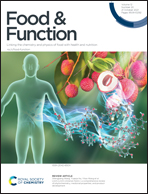Astaxanthin from Haematococcus pluvialis alleviates obesity by modulating lipid metabolism and gut microbiota in mice fed a high-fat diet†
Abstract
Obesity is a global chronic disease epidemic that is attributed to the abnormal accumulation of lipids in adipose tissue. Astaxanthin (AST) from Haematococcus pluvialis, a natural carotenoid, exhibits antioxidant, anti-lipogenic, anti-diabetic and other potent effects. Herein, we evaluated the effect of AST to illuminate its efficacy and mechanisms in high-fat diet-fed mice. AST supplementation not only significantly decreased body weight and lipid droplet accumulation in the liver but also modulated liver function and serum lipid levels. Lipidomic analysis revealed that 13 lipids might be potential biomarkers responsible for the effects of AST in lipid reduction, such as total free fatty acids (FFAs), triacylglycerols (TGs) and cholesterol esters (CEs). The gut microbiota sequencing results indicated that AST alleviated HFD-induced gut microbiota dysbiosis by optimizing the ratio of Firmicutes to Bacteroides and inhibiting the abundance of obesity-related pathogenic microbiota while promoting the abundance of probiotics related to glucose and lipid metabolism. In addition, qRT-PCR demonstrated that AST could regulate the gene expressions of the AMPK/SREBP1c pathway by downregulating lipogenesis correlated-genes and upregulating the lipid oxidant related-gene. The present study revealed the new function of AST in regulating lipid metabolism, which provided a theoretical basis for the development of high-quality AST functional food and the application of diet active substances in obesity, as demonstrated in mice.



 Please wait while we load your content...
Please wait while we load your content...